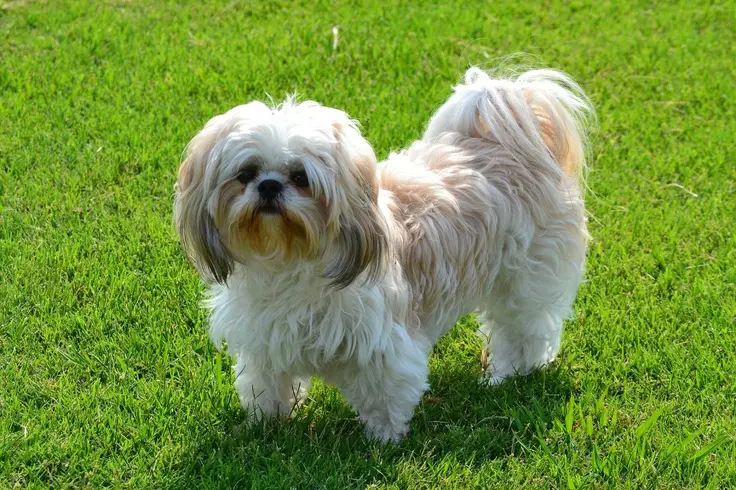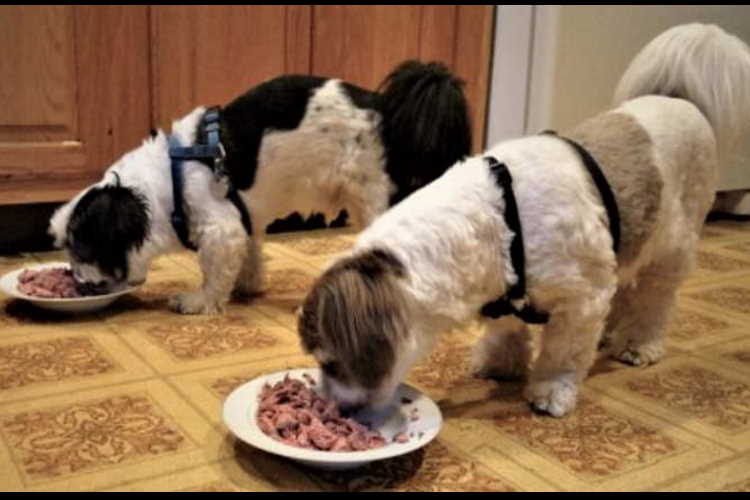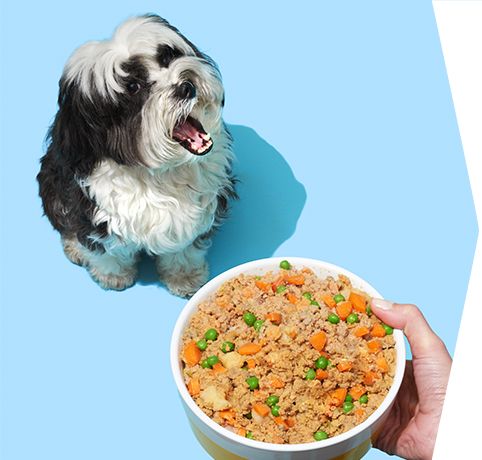
Shih Tzus are known for their adorable, compact bodies and luxurious coats, but these endearing features can sometimes mask signs of weight gain. Recognizing when your Shih Tzu is overweight is crucial for their health and longevity. This blog post will explore eight signs that your Shih Tzu might be carrying extra pounds and provide actionable steps to help them shed the excess weight.
1. Difficulty Feeling Ribs
One of the first signs your Shih Tzu may be overweight is the inability to feel their ribs easily. When you run your hands along your dog’s sides, you should be able to feel the ribs without pressing too hard. If there’s a thick layer of fat covering the ribs, it’s a clear indication of excess weight.

To check, place your hands on your dog’s sides and gently press. If you can’t feel the ribs or have to press hard to detect them, your Shih Tzu may need to lose some weight. Regularly performing this simple check can help you monitor their weight status.
2. Noticeable Fat Deposits
Another sign of an overweight Shih Tzu is the presence of noticeable fat deposits, especially around the chest, abdomen, and base of the tail. These fat pads can indicate that your dog has been consuming more calories than they burn.

Gently examine these areas for excess fat accumulation. If you notice bulges or thick layers of fat, it’s a signal that your Shih Tzu might be overweight. These fat deposits can lead to other health issues, so addressing them promptly is important.
3. Lack of a Defined Waist
A healthy Shih Tzu should have a visible waistline when viewed from above. If your dog has lost their hourglass figure and appears more barrel-shaped, this can indicate weight gain. The absence of a defined waist is a common sign of an overweight dog.
Stand above your Shih Tzu and look down at their body. If the waist is not clearly defined and the sides bulge out, it’s time to consider a weight management plan. A defined waistline is crucial for your dog’s overall health and mobility.

4. Difficulty Walking or Exercising
If your Shih Tzu shows difficulty walking or tires easily during exercise, it may be due to carrying extra weight. Overweight dogs often have reduced stamina and may struggle with physical activities that were previously easy for them.
Monitor your dog’s activity levels and note any changes in their ability to walk or play. If they seem more lethargic or unwilling to exercise, this could be a sign that their weight is affecting their overall fitness. Regular exercise is essential for maintaining a healthy weight and preventing obesity-related health issues.
5. Heavy Breathing or Panting
Overweight Shih Tzus may exhibit heavy breathing or panting even after mild exercise or in cooler weather. Excess weight can put a strain on their respiratory system, making it harder for them to breathe comfortably.

Pay attention to your dog’s breathing patterns. If they pant excessively or struggle to catch their breath during routine activities, it might be time to evaluate their weight. Proper weight management can improve respiratory function and overall wellbeing.
6. Inability to Groom Themselves
A Shih Tzu’s ability to groom themselves can be hindered by excess weight. Overweight dogs often struggle to reach certain parts of their body, leading to poor grooming and potential skin issues.
Observe your dog’s grooming habits. If they have difficulty cleaning themselves, especially in areas like the rear end or belly, this could indicate they are carrying too much weight. Ensuring your Shih Tzu can groom themselves properly is important for their hygiene and health.

7. Reluctance to Climb Stairs or Jump
Overweight Shih Tzus may show a reluctance to climb stairs or jump onto furniture. The extra weight puts stress on their joints and muscles, making these activities uncomfortable or even painful.
Watch your dog’s behavior around stairs and furniture. If they avoid climbing or jumping, it might be due to the discomfort caused by excess weight. Maintaining a healthy weight can help improve their mobility and reduce joint strain.
8. Frequent Health Issues

Being overweight can lead to various health issues in Shih Tzus, such as diabetes, heart disease, and joint problems. If your dog frequently visits the vet for health-related problems, it could be linked to their weight.
Keep track of your dog’s veterinary visits and any recurring health issues. Addressing their weight can help prevent many obesity-related conditions and improve their overall quality of life.
How to Help Your Shih Tzu Lose Weight
Recognizing the signs of an overweight Shih Tzu is the first step; the next is taking actionable steps to help them achieve a healthier weight. Here are some strategies to assist your dog in shedding those extra pounds:

1. Balanced Diet
A balanced diet is crucial for weight management. Consult your veterinarian to determine the appropriate type and amount of food for your Shih Tzu. Opt for high-quality, low-calorie dog food that provides essential nutrients without excess calories.
Measure your dog’s food portions accurately and avoid free-feeding. Feeding your Shih Tzu at regular intervals can help control their calorie intake and prevent overeating. Additionally, avoid giving table scraps or high-calorie treats that can contribute to weight gain.
2. Regular Exercise

Regular exercise is essential for weight loss and overall health. Incorporate daily walks and playtime into your Shih Tzu’s routine. Start with short, manageable walks and gradually increase the duration as your dog builds stamina.
Interactive toys and games can also keep your dog active and mentally stimulated. Aim for at least 30 minutes of physical activity each day to help your Shih Tzu burn calories and maintain a healthy weight.
3. Monitor Treat Intake

Treats can add unnecessary calories to your dog’s diet. Choose low-calorie treats and limit the number of treats you give each day. Consider using healthy alternatives like carrot sticks or apple slices, which are low in calories and high in nutrients.
Use treats sparingly and as rewards for good behavior or during training sessions. Be mindful of the overall calorie intake from treats and adjust their main meals accordingly.
4. Regular Health Checkups
Regular veterinary checkups are vital for monitoring your Shih Tzu’s weight and overall health. Your vet can provide guidance on weight management and recommend specific dietary or exercise plans tailored to your dog’s needs.

During checkups, discuss your dog’s progress and any concerns you may have. Regular monitoring ensures that your weight management efforts are effective and allows for adjustments if needed.
5. Create a Feeding Schedule
Establishing a consistent feeding schedule can help regulate your dog’s appetite and prevent overeating. Divide their daily food allowance into smaller, more frequent meals to keep them satisfied throughout the day.
Avoid feeding your Shih Tzu late at night, as this can lead to weight gain. A structured feeding schedule promotes a healthy metabolism and helps control calorie intake.

6. Engage in Mental Stimulation
Mental stimulation is as important as physical exercise for weight management. Engage your Shih Tzu in brain-stimulating activities such as puzzle toys, obedience training, or scent games. These activities keep your dog mentally engaged and can prevent boredom-related overeating.
Interactive toys that dispense food can also encourage slow eating and provide mental enrichment. Incorporating mental challenges into your dog’s routine supports their overall health and wellbeing.

7. Avoid High-Calorie Foods
Avoid feeding your Shih Tzu high-calorie foods, including fatty meats, dairy products, and sugary snacks. These foods contribute to weight gain and can lead to other health problems. Stick to a diet that consists of lean proteins, vegetables, and whole grains.
Consult your veterinarian before making any significant changes to your dog’s diet. They can provide guidance on safe and nutritious food choices that support weight loss and health.
8. Stay Consistent and Patient

Weight loss takes time and requires consistency and patience. Stick to your dog’s weight management plan and avoid making sudden changes that could disrupt their progress. Celebrate small victories and remain committed to helping your Shih Tzu achieve a healthy weight.
Track your dog’s weight and body condition regularly to ensure they are on the right path. With dedication and proper care, your Shih Tzu can achieve and maintain a healthy weight.
Conclusion
Recognizing the signs of an overweight Shih Tzu and taking proactive steps to manage their weight is essential for their health and longevity. By monitoring their diet, exercise, and overall lifestyle, you can help your Shih Tzu achieve and maintain a healthy weight. Regular veterinary checkups, a balanced diet, and consistent exercise are key components of a successful weight management plan. With your dedication and care, your Shih Tzu can enjoy a healthier, happier life free from the complications of obesity.


